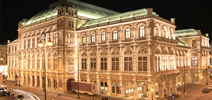The beginning of Opera in Vienna
In the late 18th century most Viennese composers wrote operas not in their native German language but in Italian or French. This changed in 1778, when the Austrian Emperor, Joseph II, decided to foster operas written in the German language by establishing the “National Singspiel” at the Vienna Burgtheater. In 1782 the Singspiel produced “Die Entführung aus dem Serail”, composed by the 26 year old W. A. Mozart, which was a huge and immediate success. This was the first Viennese commission for the young Mozart, composed in the Singspiel character, which offered interludes of spoken dialogues interspersed with music in the style of popular songs, ballads, arias and ensembles. In 1783 the “National Singspiel” disbanded, however the success of Mozart’s opera was a strong signal that the people of Vienna desired operas in their native tongue and in the following years theatres in Vienna were offering operas in the German language. In 1791 it was once again Mozart with his “Magic Flute” (“Die Zauberflöte”) who cleared the way for future opera productions in the German language in Vienna. Less than 15 years later Ludwig van Beethoven borrowed characteristic ‘Singspiel’ elements found in the Magic Flute for his own opera “Fidelio” which premiered in 1805 in Vienna’s elegant Theater an der Wien and was the only opera composed by the great Beethoven.
Operetta in Vienna
Later in the 19th century a new and lighter form of Opera emerged in Vienna: the Operetta. The operetta was initially made wildly popular by works of the German born, French composer Jacques (born Jacob) Offenbach. Desiring again a truly national version of this new genre, the great and homegrown Viennese success, Johann Strauss II was convinced to leave his extremely successful post as ‘Hofballmusikdirektor’ to compose his first operetta, Indigo, or the Forty Thieves, which was produced in 1871. An Operetta is a comic opera, light in character with tuneful melodies, often a flippant story with political or cultural satire in the content, and uses spoken dialogues interspersed with musical sections, not wholly different in character and form from the Singspiel operas of the late 18th century in this way. The first big success in the German operetta genre was “Die Fledermaus” (1874) of Johann Strauss the Younger, which was premiered in Vienna’s Theatre an der Wien (you will remember this is also where Beethoven’s Fidelio premiered in 1805). Another landmark operetta in this early phase was “The Merry Widow” (1905) of Franz Lehár and this too received its premiere at the theater an der Wien along with his “Der Graf von Luxemburg”.
Richard Strauss Operas
Another composer who was closely connected with opera in Vienna and with the Vienna Philharmonic Orchestra was German born Richard Strauss, no relation to the Viennese Strauss family. Richard Strauss (1864 – 1949) was a very powerful figure in Vienna. Influenced by the music of Richard Wagner, especially by Wagner’s “Tristan und Isolde”, Strauss managed to establish himself as Germany’s leading and most forward thinking composer of operas with his works- “Salome” (1905) and “Elektra” (1908). With “Der Rosenkavalier” (1910) Strauss re-oriented his compositional style towards that of Mozart and the traditional Viennese Waltz. Although critics claimed that he was ‘selling-out’, Rosenkavalier was a huge success. Strauss continued to disregard critics and produced in 1916 “Ariadne auf Naxos” which, in its second and final version, takes place in 19th century Vienna. In 1942 Strauss moved back to Vienna with his family in order to use his influence there to protect Jewish members of his family from the Nazi regime. After the war he returned to his native Germany and composed until his 84th year.
Famous Vienna Opera Houses
Vienna State Opera
The Vienna State Opera is both, a venue for operas and a company for operas. The Vienna State Opera is based in Vienna, Austria and it’s history can be tracked back to the middle of the 19th century.
Vienna Volksoper
The Vienna Volksoper is the second largest Venue for operas, musicals and concerts in Vienna.It was built in 1898 to celebrate the 50th anniversary of Emperor Franz Joseph I.

